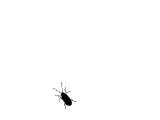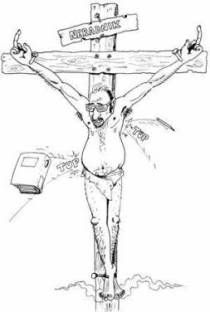|
Mislim, stvarno sam ostao zapanjen. Onaj luđak, Chavez, mi se stvarno počeo sviđati. Čovjek je donio nekoliko povijesno važnih odluka u zadnjih nekoliko tjedana.
Kao prvo, uspio je vratiti sve dugove Svjetskoj banci (koje je Venezuela natukla kreditima) i sada će ih lijepo otkantati. Mrak, kad bih bar ja tako mogao sa svojom karticom. I uz to što ih je otkantao, još traži nekoliko dolarčića koji su mu ostali tamo. Lik je zakon. Ujedno je tražio izlaz iz MMF-a. Sad, ak je pametan, nek počne prodavati naftu po povoljnoj cijeni i to u Eurima, ode američka ekonomija kvragu. Naravno, ne odmah, ali ako će što više zemalja od njega uzimati naftu, kroz neki relativno kratki period moglo bi se desiti. A kaj mi je najbolje, još je ponudio ekonomsku pomoć u vidu beskamatnih kredita zemljama koje bi se isto tako htjeli riješiti svjetskih bankarskih tiranina.
Zadnja vijest vezana za ovog veselog čovječuljka. Odhebao je i Monsanto, majstore GMO-a iz svoje zemlje. Uh, kada bi se barem ovi naši foteljaši ugledali na njega.
VENEZUELA: Chavez dumps Monsanto
Jason Tockman, Caracas From: Governor
Sunday, April 29, 2007 1:34 PM
 Venezuelan President Hugo Chavez Frias has announced that the cultivation Venezuelan President Hugo Chavez Frias has announced that the cultivation
of genetically modified crops will be prohibited on Venezuelan soil,
possibly establishing the most sweeping restrictions on transgenic crops
in the western hemisphere.
Though full details of the administration's policy on genetically modified
organisms (GMOs) are still forthcoming, the statement by President Hugo
Chavez will lead most immediately to the cancellation of a contract that
Venezuela had negotiated with the US-based Monsanto Corporation.
Before a recent international gathering of supporters in Caracas, Chavez
admonished genetically engineered crops as contrary to interests and needs
of the nation's farmers and farmworkers. He then zeroed in on Monsanto's
plans to plant up to 500,000 acres of transgenic soybeans in Venezuela.
"I ordered an end to the project", said Chavez, upon learning that
transgenic crops were involved. "This project is terminated."
Chavez emphasised the importance of food sovereignty and security -
required by the Venezuelan Constitution - as the basis of his decision.
Instead of allowing Monsanto to grow its transgenic crops, these fields
will be used to plant yuca, an indigenous crop, Chavez explained. He also
announced the creation of a large seed bank facility to maintain
indigenous seeds for peasants' movements around the world.
The international peasants' organisation Via Campesina, representing more
than 60 million farmers and farmworkers, had brought the issue to the
attention of the Chavez administration when it learned of the contract
with Monsanto. According to Rafael Alegria, secretary for international
operations of Via Campesina, both Monsanto and Cargill are seeking
authorisation to produce transgenic soy products in Venezuela.
"The agreement was against the principles of food sovereignty that guide
the agricultural policy of Venezuela", said Alegria when informed of the
president's decision. "This is a very important thing for the peasants and
indigenous people of Latin America and the world."
Alegria has good reason to be concerned. With a long history of social and
environmental problems, Monsanto won early international fame with its
production of the chemical Agent Orange - the Vietnam War defoliant linked
to miscarriages, tremors, and memory loss that more than 1 million people
were exposed to. More recently, the company has been criticised for
side-effects that its transgenic crops and bovine growth hormone (rBGH)
are believed to have on human health and the environment.
Closer to home in Venezuela, Monsanto manufactures the pesticide
"glyphosate", which is used by the neighbouring Colombian government as
part of its Plan Colombia offensive against coca production and rebel
groups. The Colombian government aerially sprays hundreds of thousands of
acres, destroying legitimate farms and natural areas like the Putomayo
rainforest, and posing a direct threat to human health, including that of
indigenous communities.
"If we want to achieve food sovereignty, we cannot rely on transnationals
like Monsanto", said Maximilien Arvelaiz, an adviser to Chavez. "We need
to strengthen local production, respecting our heritage and diversity."
Alegria hopes that Venezuela's move will serve as encouragement to other
nations contemplating how to address the issue of GMOs.
"The people of the United States, of Latin America, and of the world need
to follow the example of a Venezuela free of transgenics", he said.

|























 Venezuelan President Hugo Chavez Frias has announced that the cultivation
Venezuelan President Hugo Chavez Frias has announced that the cultivation 














